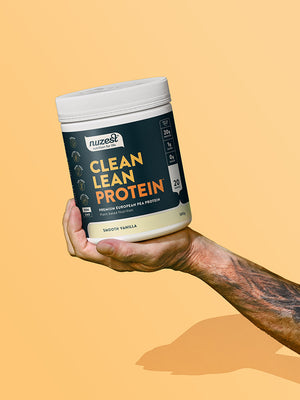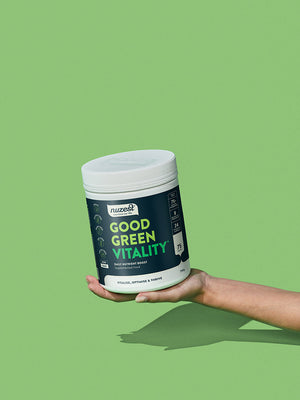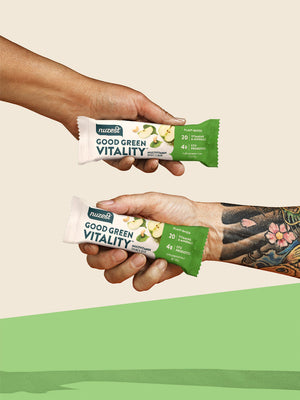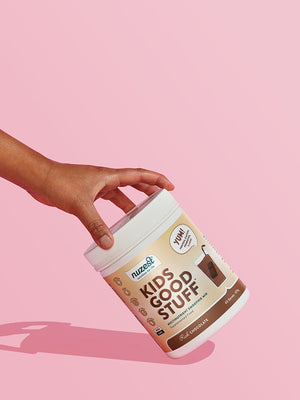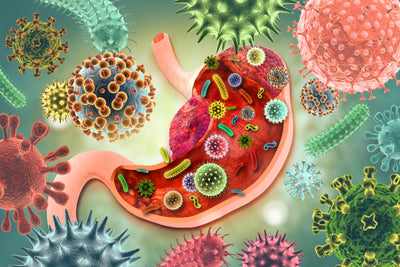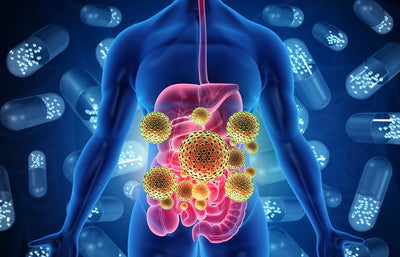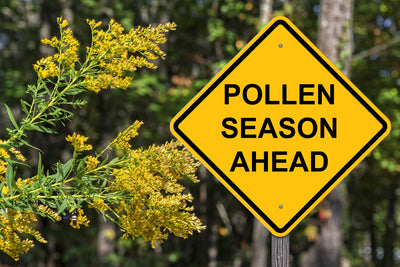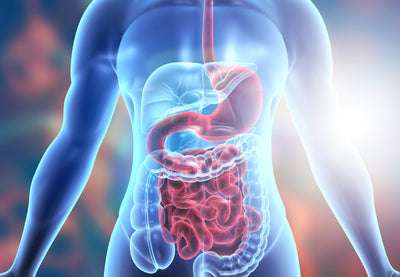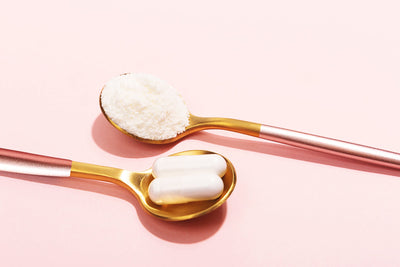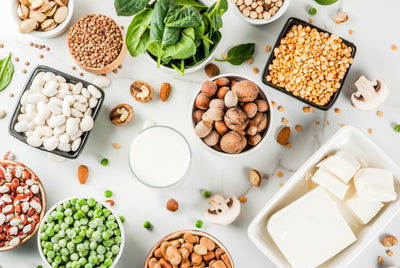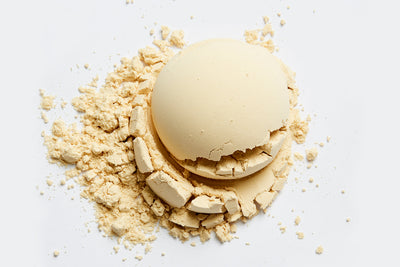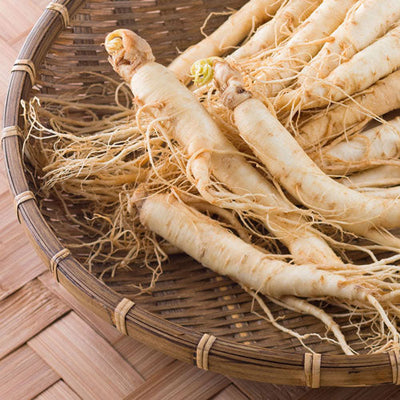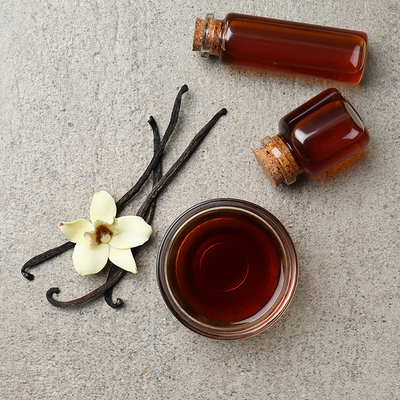
8 min read
Myth Busting Inflammation
Posted By
Bold Commerce Collaborator
TITLE: Myth Busting Inflammation
AUTHOR: Rachel Hawkins (Dietitian & Nutritionist)
Inflammation has always been a hot topic among the health conscious. But, as with all popular health topics, the large sea of information made available to us through a simple Google search can make it difficult to determine fact from fiction.
We asked Australian Dietitian and Nutritionist, Rachel Hawkins, to set the record straight by busting some common myths on the topic of inflammation.
Is all inflammation bad for you? Do dairy and sugar really cause inflammation? Are turmeric supplements magic anti-inflammatory pills? We answer these questions and more below.
Myth 1: All inflammation is 'bad' for you
Inflammation is a normal immune response that plays an integral role in healing.
There are two main forms of inflammation; acute and chronic inflammation.
Acute inflammation comes on quickly and tends to subside within hours, days or weeks and can arise as the result of infection or injury.1 For example, acute inflammation would occur as the result of an ankle sprain. However, this inflammation is considered ‘good’ inflammation as it actually helps to protect the injured muscle from further damage.
In contrast, chronic inflammation is long-lasting inflammation. This type of inflammation is thought to be the cause of many diseases, so is what we would typically refer to as ‘bad’ inflammation.1
Verdict: Myth.
To learn more about ‘good’ and ‘bad’ inflammation, read our article from Registered Dietitian, Andy de Santis, explaining how inflammation can impact human health
Myth 2: All sugar causes inflammation
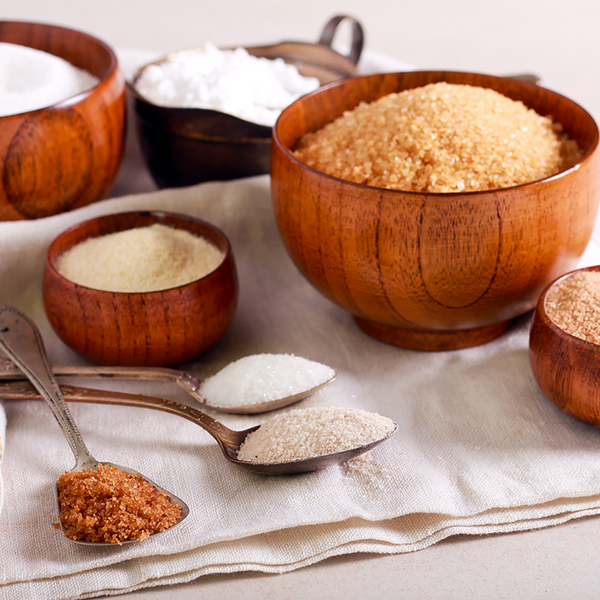
Table sugar (sucrose) and high-fructose corn syrup are two of the most common ‘added sugars’ in a western diet. Research indicates that consuming a diet high in added sugars, specifically sucrose and fructose, promotes inflammation which can lead to the development of diseases such as obesity, insulin resistance and diabetes.2-5
However, not all sugars are made equal.
Naturally occurring sugars, found in foods such a fruit, honey and maple syrup, actually contain compounds that are anti-inflammatory. Honey in particular has been well researched for its anti-inflammatory properties as it contains two bioactive compounds, called flavonoids and polyphenols, that act as antioxidants to help reduce free radical damage, and thus inflammation, in the body.6
Fruit is also valuable source of antioxidants, as well as fibre. Research suggests that the consumption of fibre rich foods, including fruit, help to lower the inflammatory process associated with many chronic diseases.7
So, when it comes to sugar, not all sugar causes inflammation. Instead, it is the type and dose that is important.
Verdict: Myth.
Myth 3: Dairy causes inflammation
The question of whether dairy causes inflammation is a controversial one and there is research to support both sides of the argument.
Dairy foods include yogurt, kefir, cheese, butter, cream and ice cream. Dairy products contain many important nutrients including protein, calcium, probiotics, B vitamins and vitamin D.8 They also contain saturated fat. The saturated fat found in dairy products was once believed to promote the inflammation that led to the development of heart disease. However, a 2017 review that analysed results from 52 human clinical trials looking at dairy and inflammation, actually found that dairy had a weak, yet statistically significant anti-inflammatory effect in the body.9
So, what does that mean? Well it means that the saturated fat found in dairy products might not be as inflammatory as once thought.
While the consumption of dairy products has been linked to certain inflammatory conditions such as acne12, the evidence supporting this is weak.
Therefore, if we look at the whole body of evidence, we can conclude that dairy products do not promote inflammation in the general population – except in those people with a dairy allergy.
Verdict: Myth
Myth 4: You can reduce systemic inflammation through diet and lifestyle change
Let me start by defining what systemic inflammation is.
Systemic inflammation is used to describe when inflammation occurs throughout the whole body. It is a form of chronic, or long-lasting inflammation, that contributes to the development of disease.
The Mediterranean Diet is an eating pattern that has anti-inflammatory properties and has been well-researched for its effectiveness in preventing and treating a range of chronic and inflammatory-related diseases, such as heart disease, type 2 diabetes, depression and cognitive decline.13
A Mediterranean Diet is predominately plant-based and includes wholefoods such as fruit, vegetables, wholegrains, legumes, beans, nuts and extra virgin olive oil, all of which are rich in antioxidants. Importantly, the benefits of this diet are related to the dietary pattern as a whole, and not individual foods or nutrients.13
Beyond what we eat, there are a number of other lifestyle factors that can increase the state of inflammation in our body. They include a lack of sleep, chronic stress, physical inactivity, smoking and excessive alcohol consumption.14
Therefore, by implementing healthy lifestyle changes around these factors and adopting more of a Mediterranean style of eating you can be well on your way to reducing systemic inflammation.
Verdict: Truth
Myth 5: I’ll just have some turmeric…
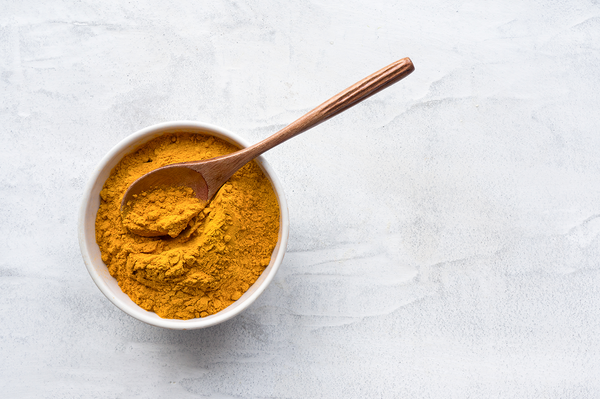
While I’d love to tell you that curcumin, the active compound in turmeric, will reduce inflammation and improve symptoms associated with inflammatory conditions, the reality is that no one single nutrient is a magic cure-all.
When it comes to reducing inflammation, a multifactorial and multinutritional approach which addresses the dietary and lifestyle changes mentioned previously, is best.
There are certain supplements which may help to reduce inflammation by providing the body with antioxidant protection. They include curcumin, fish oil, resveratrol and ginger.15-18 (Please note the disease states in which benefit has been observed with supplementation of these nutrients are varied).
However, don’t expect a miracle cure. The bigger picture matters more here than single nutrients alone. Thus, if choosing to supplement, do so in conjunction with a balanced wholefood diet.
Verdict: Myth
References
- https://www.khanacademy.org/test-prep/mcat/biological-sciences-practice/biological-sciences-practice-tut/e/assemblies-of-molecules--cells-and-groups-of-cells-within-single-cellular-and-multicellular-organisms
- https://pubmed.ncbi.nlm.nih.gov/26081486/
- https://pubmed.ncbi.nlm.nih.gov/19403712/
- https://pubmed.ncbi.nlm.nih.gov/25639270/
- https://pubmed.ncbi.nlm.nih.gov/24366371/
- https://www.ncbi.nlm.nih.gov/pmc/articles/PMC5424551/
- https://www.scielo.br/scielo.php?script=sci_arttext&pid=S1679-45082010000200254&lng=en&nrm=iso&tlng=en
- https://www.healthdirect.gov.au/dairy-foods
- https://www.tandfonline.com/doi/full/10.1080/10408398.2014.967385
- https://www.ncbi.nlm.nih.gov/pmc/articles/PMC4097976/
- https://onlinelibrary.wiley.com/doi/full/10.1111/j.1365-2249.2007.03434.x
- https://pubmed.ncbi.nlm.nih.gov/29778512/
- https://www.health.qld.gov.au/__data/assets/pdf_file/0032/946049/cardiac-meddiet.pdf
- https://www.ncbi.nlm.nih.gov/books/NBK493173/
- https://www.ncbi.nlm.nih.gov/pmc/articles/PMC3535097/
- https://www.ncbi.nlm.nih.gov/pmc/articles/PMC3575932/
- https://pubmed.ncbi.nlm.nih.gov/22055504/
- https://pubmed.ncbi.nlm.nih.gov/24490949/
Related news
min read
An Introduction to Gut Health & Nutrition – 5 Must See Articles
Gut health significantly affects overall wellbeing, influencing brain function, immunity, and metabolism. A balanced gut microbiota, influenced by diet and environment, can potentially enhance health, aid digestion, and reduce allergies. The roles of probiotics and prebiotics in gut health are also discussed.
min read
Probiotics vs. Prebiotics
Unleash gut health with probiotics and prebiotics! Strengthen digestion, immunity, and overall well-being. Try Nuzest's Good Green Vitality for convenient support with 8 billion CFU of probiotics. Take charge now!
min read
The Link Between Gut Health & Allergies - Plus 5 Top Tips to Help
Discover the link between gut health and allergies, and how the gut microbiome influences the body's immune response to allergens. Learn how adopting a balanced diet with prebiotics and probiotics can support gut health, reducing the risk of allergic reactions. Explore solutions for allergy relief and fostering a healthier gut with Nuzest’s multi-nutrient formula, Good Green Vitality.
min read
The Great Diet Debate: Unravelling the Tapestry of Popular Eating Plans
Exploring popular diets such as the Mediterranean, Ketogenic, Plant-Based, Paleo, and Intermittent Fasting, this overview highlights their principles, benefits, and considerations. It emphasizes the importance of finding a dietary pattern that aligns with individual health goals and preferences, while suggesting the potential benefits of incorporating a multi-nutrient supplement for overall health.
min read
The Gut Connection: How to Improve Your Digestion and Gut Health in 6 Steps
Discover the significance of gut health and its impact on digestion and overall well-being in this insightful article. Learn six practical steps, including maintaining a balanced diet, staying hydrated, managing stress, and using antibiotics wisely, to promote a healthy gut and enhance vitality.
min read
Does Gut Health Affect Your Immune System? | Do These 6 Things
The gut microbiome, which consists of trillions of bacteria in our digestive tract, plays a crucial role in supporting our immune system and overall health. Consuming probiotics and prebiotics, staying hydrated, managing stress, limiting processed foods, and engaging in outdoor activity and exercise are effective strategies to promote a healthy gut and enhance immunity.
min read
What is Collagen? Types, Sources and Benefits of Supplementation
Collagen is essential for joints, bones, muscles, ligaments, tendons, cartilage, skin, hair and nails.2 It is one of the primary structural proteins of connective tissue and plays a crucial role in the body by cushioning, strengthening, hydrating, binding, and connecting tissues together.3 Connective tissues are able to provide physical and mechanical support through the collagen, elastic and reticular fibres
min read
Kids Good Stuff for Skin Health
How can you ensure your kids have healthy skin? A part from the obvious, what nutrients can we provide our kids to ensure their skin stays in tip top shape?
min read
Maximising Mood In Your Kids
Almost 1 in 7 children and adults aged 4-17 had been diagnosed with a mental health disorder. Amy Butler discusses good nutrition and lifestyle modifications, that can help to reduce the risk.
min read
Long-Lasting Energy For Kids
Children and adolescents are going through massive periods of growth and development. To keep up with the demands of school, extracurricular activities, sports and friendships, kids often need a bit of an energy boost. In our latest blog we break down some specific nutrients for energy, to help support growing kids, and the best places to source them from.
min read
Setting Health Goals & Staying Motivated in 2021
Use this tried and tested goal strategy to set smaller, specific goals to avoid the overwhelm of unrealistic and vague health objectives.







